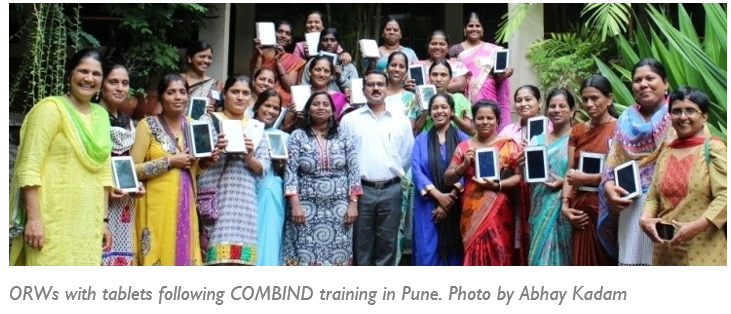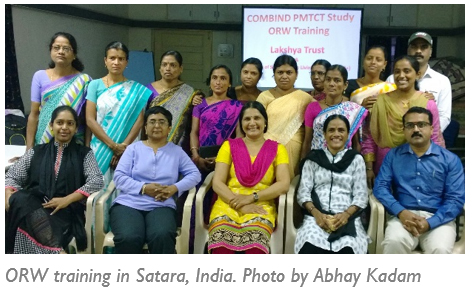Can Technology & Training Promote Retention in Care & Prevent HIV Transmission?
When HIV+ mothers are actively engaged in care, they are far less likely to transmit the disease to their babies. And while HIV+ women in India generally seek initial care, maintaining continuity of care can be challenging. One study in India seeks to answer the question: Can a focused empowerment training combined with mobile health technology help outreach workers improve their capacity to prevent a newborn in India from becoming infected by her HIV+ mother?
Effective behavioral interventions are those that optimize conditions for taking action. Using the latest innovations in behavioral science and mobile technologies, the Johns Hopkins Center for Clinical Global Health Education (CCGHE) is collaborating with Lakshya, a Pune, India-based NGO, on Community Home Based India Prevention of Mother to Child Transmission of HIV, or COMBIND. Funded by the U.S. Centers for Disease Control and Prevention, this randomized study is assessing whether Indian healthcare outreach workers (ORWs) who participate in empowerment training and are provided with mobile health technology are better able to keep HIV+ pregnant and breastfeeding women engaged in care than ORWs who use the existing paper-based approach.
 CCGHE has a successful track record of mobile health technology development and behavioral interventions for improving care retention in global health settings, and has been involved in this effort since early in the study design phase. The project was officially launched in India in spring 2015, with ORWs from Integrated Counseling and Testing Centers (ICTCs) across 4 Indian districts (Pune, Thane, Satara, and Sangli) participating. The target enrollment is 900 HIV+ pregnant and breastfeeding women, and maternal and infant health will be tracked until the babies reach 18 months.
CCGHE has a successful track record of mobile health technology development and behavioral interventions for improving care retention in global health settings, and has been involved in this effort since early in the study design phase. The project was officially launched in India in spring 2015, with ORWs from Integrated Counseling and Testing Centers (ICTCs) across 4 Indian districts (Pune, Thane, Satara, and Sangli) participating. The target enrollment is 900 HIV+ pregnant and breastfeeding women, and maternal and infant health will be tracked until the babies reach 18 months.
While the control group of ORWs is providing the standard of care, the experimental group is receiving enhanced motivational training that focuses on, and relies heavily on input from, the ORWs themselves. “This is a behavioral change training model, where we focus on self recognition, self motivation, and how ORWs can be agents of change in their communities,” explains Principal Investigator Dr. Nishi Suryavanshi. “This focus on self-empowerment is a core training competency that allows ORWs to gain a deeper understanding of what underlies behavior change for others and themselves.”
Tablets and the emocha® mobile health platform developed by CCGHE are being used to collect health information, follow up with patients through text messaging, and provide health education to HIV+ pregnant and breastfeeding women. With access to video messaging and other interventions at the click of a button, it is hoped that ORWs can improve linkage to care over the long term. Technology training provides ORWs with hands-on experience with tablet technology—for many, this is the first time they’ve used a touch-screen device.
Empowerment training for the experimental cohort was held for outreach workers, the tablet and the emocha® mobile health platform are being used, and visits to HIV+ women enrolled in the study are underway. The effort was initially slated to end in March 2016, and has been extended through August 2017.
 The feedback thus far has been overwhelmingly positive. Many ORWs have noted that, in the past, the standard professional training sessions they attended were conducted as lectures during which they had never been encouraged to speak. One ORW commented “this is first time [we are being asked] what we feel, what our suggestions are, what challenges we face in the field. Not only this, you are asking us about our own life, our qualities, our self respect."
The feedback thus far has been overwhelmingly positive. Many ORWs have noted that, in the past, the standard professional training sessions they attended were conducted as lectures during which they had never been encouraged to speak. One ORW commented “this is first time [we are being asked] what we feel, what our suggestions are, what challenges we face in the field. Not only this, you are asking us about our own life, our qualities, our self respect."
ORWs shared feedback on the emocha® mobile health platform and found the device and training very useful in recording data and in counselling women. One ORW noted "A patient's husband called me and asked me to show him all videos I showed to his wife. I went and showed all videos on my tablet, and he was very happy and said that they never got this kind of information and it is really useful to know all this information about ART, breastfeeding, and the baby's testing"
